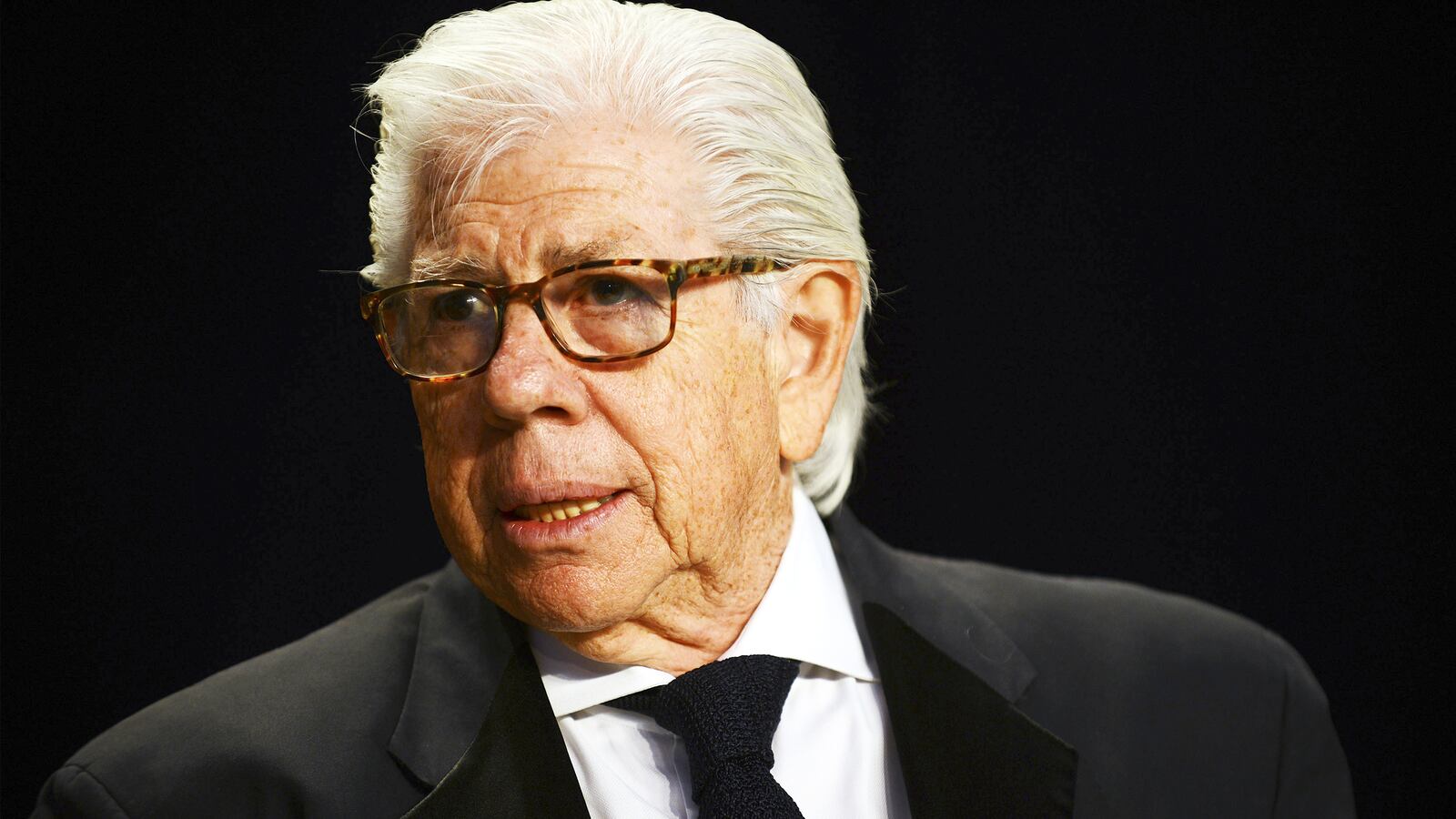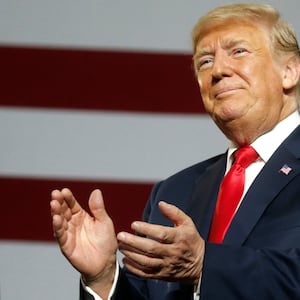Don’t do it live!, Watergate sleuth Carl Bernstein advises television news execs concerning the tendentious speechifying of President Donald Trump.
Butt out!, one of TV’s top decision-makers replies.
And so it goes.
With his gift for stoking anger and dividing the country, to say nothing of his unrivaled dominance of the media-political complex, it’s hardly surprising that Trump is also provoking disagreement in the ranks of television news organizations.
During a moment when the so-called “enemies of the people,” as Trump would have it, are largely focused on the president’s draconian new rules of engagement at press conferences and his foiled attempt to confiscate the hard pass of CNN’s pugnacious White House correspondent Jim Acosta, Bernstein clearly touched a nerve on Sunday’s installment of Reliable Sources.
On the program, he suggested that Trump is essentially playing cable news organizations that air his often-venomous streams of consciousness live and unfiltered.
“I don't think we should be taking them live all the time and just pasting him up on the air because they're basically propagandist exercises, because they are overwhelmed by his dishonesty and lying,” Bernstein, a CNN political analyst, told the network’s media critic Brian Stelter.
“So, how could we cover it differently? Maybe we should be there, edit, decide as reporters what is news, and after the press conference or briefing is over, then go with that story with clips, rather than treating the briefing or press conference as a campaign event, which they really are and which we did in the campaign as well; we gave them all this free airtime on cable news especially.”
Bernstein, who argued that video of the president’s unexpurgated remarks can be posted on the various news organizations’ web sites, added that “we need to start editing. We need to say, here is the story, not just give him a microphone when we know his methodology is to engage us on the basis of lying, propaganda and agitprop.”
Officially, Fox News, MSNBC and CNN—the three top-rated cable news outlets—declined to comment on Bernstein’s recommendation. But a longtime TV news executive is less than impressed.
“The bottom line is that people like Carl Bernstein and anybody else can say anything they want about what we should or shouldn’t do,” the exec told The Daily Beast, asking not to be further identified because this person is not authorized to publicly discuss the organization’s practices and policies.
“The silly thing is when people make declarations like ‘we shouldn’t read his tweets or talk about his tweets.’ Let’s not focus on rules about what we should or shouldn’t do because we might disagree with his means of getting his message out there. He’s the president. If he says something, it’s worth noting.”
The exec continued: “Whether or not it’s worth taking live is another question. Whether or not you have to report on everything single tweet is another question. None of this is an algorithm. We are not bots. It’s on a case-by-case basis. If Carl Bernstein wants to make this decision for everybody, so be it. But no one’s going to listen to him.”
In an interview with The Daily Beast, however, Bernstein stressed that he isn’t trying to make general rules for Trump coverage—or even argue that the president’s remarks aren’t newsworthy.
“The last thing I’m suggesting is that we be dogmatic and hard-set in a bunch of rules about how we do this, without using sensible journalistic and reportorial flexibility,” said Bernstein, who in a former life, more than three decades ago at the dawn of the Reagan administration, was Washington bureau chief for ABC News. “But I do think it’s necessary to take another look at how we cover especially the briefings and also some live events that the president calls—including sometimes perhaps press conferences…There’s no reason we need to, as a matter of course, cut to free airtime right away.”
Indeed, MSNBC host Nicolle Wallace, along with her bosses, recently opted not to accord live coverage to Trump’s remarks during her 4 p.m. program after learning from her White House sources that they were likely to be a partisan rant targeting the midterm elections.
The other cable outlets did carry Trump’s speech—prompting Washington Post media critic Erik Wemple to tweet: “predictably, this address by @ realDonaldTrump is just a clump of caravan hype. It's a campaign rally without the crowd. MSNBC is 100 percent correct to blow off live airing.”
Of course, at least since Trump’s inauguration, MSNBC has made a deliberate effort to pitch its political coverage to an audience that largely believes that the former reality star is a blight on the presidency—and thus its viewership would hardly take offense at the omission. All three cable outlets, including Fox News, months ago stopped the reflexive practice of airing Trump’s rallies live.
Yet among media critics and former television executives interviewed by The Daily Beast, Bernstein’s recommendation received reactions ranging from support for the journalistic principles involved to skepticism about the practicalities.
“It’s not practical,” argued Lucy Dalglish, dean of the University of Maryland’s Philip Merrill College of Journalism. “If these networks, which are increasingly financially challenged, weren’t making tons of money on Trump, they wouldn’t do it. They know that they could do a story, particularly television, by not running it live, and everybody could get the gist of what was said.
“But this has to equate to money. And if they don’t do it [air Trump events live], somebody else will, and somehow they’re finding an audience for this stuff. That’s the practical answer. Even if we wished it to happen, I don’t think it’s going to happen.”
Former ABC News President David Westin, meanwhile, warned that news organizations that don’t carry the president’s unfiltered remarks could open themselves up to charges of partisanship.
“In terms of whether what is being said is accurate or not, it is the job of the news organization to follow up and to fact-check it,” Westin said. “But it’s not the job of the news organization, from the beginning, to decide, that things are going to be inaccurate and therefore we’ll keep it from the American people.”
Westin continued: “One of the worst mistakes that the press can make right now is to change their rules of engagement. Because that actually gives people who support the president an argument that now the press is changing, they’re becoming partisan. The press’s job is to play it down the middle, without regard to who the president is.
“I think it’s a terrible mistake for the Republic, but for the press in particular, for them to be changing the rules of engagement based on what they think about the substance of the president’s speech. That’s wrong. In a sense that is exactly what the White House tried to do with Acosta—which is to exclude somebody based on the content of his speech.”
Jonathan Klein, former president of CNN/US, offered a nuanced view, texting The Daily Beast: “My gut reaction is that the case-by-case basis might make sense, depending on the context of the event—what is he doing, who is he speaking to, why, what else is going on? For example, if Don Jr just got indicted, and Trump had an event that night, you’d want to be there.”
Klein added: “I guess the counter-argument [to Bernstein’s suggestion] would be that the fact that the president of the US is saying something makes it important per se. For example, if those suburban white women hadn’t known what ugliness he was spewing, they would not have been able to make the informed choices they did on Election Day. One downside of all that live coverage is that it crowds out real reporting on the administration and the impact of its policies. You need to do both.”
Former CBS News President Andrew Heyward pointed out that the broadcast networks for decades have been picking and choosing which presidential remarks are worth carrying—regularly denying the White House free air time if they determined that a speech was likely to be political and not substantive.
Every White House has complained about their coverage, going back at least to the moment in 1970 when Richard Nixon’s vice president, Spiro Agnew, assailed the “nattering nabobs of negativism”—i.e. the network commentators who critiqued the president’s televised addresses.
But the advent of cable television has created a different imperative, Heyward said. While Bernstein’s suggestion “makes a lot of sense editorially,” it comes with a potential ratings risk “given the intense competition among the three cable networks, and the zero switching costs—in other words, viewers can move easily from channel to channel.”
George Washington University media and public affairs professor Frank Sesno, CNN’s former Washington bureau chief, offered measured agreement with Bernstein.
“Airtime matters, and you don’t just hand it over to an elected official because they want the airtime,” he said. “There should be a reason and a rationale behind it. This is not state-run television.”
Echoing Bernstein, journalism school dean Dalglish lamented that to the extent that cable outlets in particular are broadcasting the president live and unedited, “the only thing it’s doing at this point is riling up the base. Trump does [such events] because he knows he can use it to goad the media, and it serves his interests. It’s really hideous that somebody in his position has figured out how so brilliantly to manipulate the media. It’s very, very troubling.”







